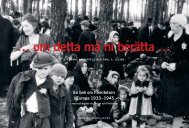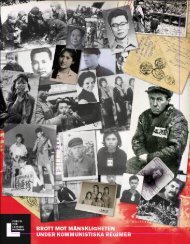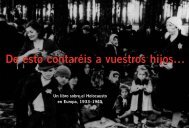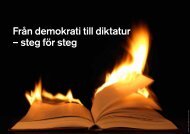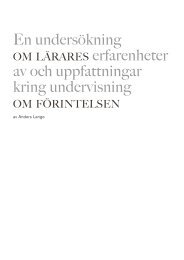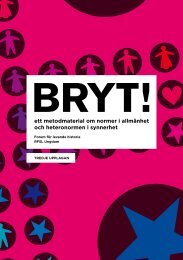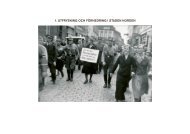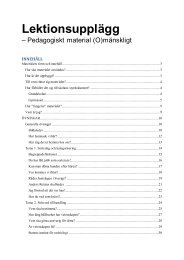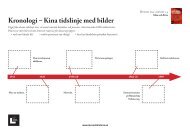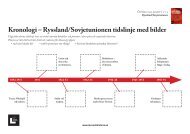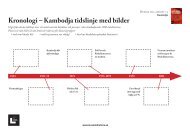Children…
Tell Ye Your Children... - Levandehistoria.se
Tell Ye Your Children... - Levandehistoria.se
- No tags were found...
Create successful ePaper yourself
Turn your PDF publications into a flip-book with our unique Google optimized e-Paper software.
The Holocaust<br />
– lessons to be learned?<br />
The war in Europe had two primary elements. One was<br />
the catastrophic “conventional” political war, fought<br />
over power and resources. Tens of millions of people<br />
lost their lives, and the destruction was beyond comprehension.<br />
But it also had an unprecedented element.<br />
For the Nazis, this was an ideological war: it was the<br />
“great race war” whose goal was to place Europe under<br />
“Germanic” rule. Only by eliminating all other political<br />
systems, and suppressing or eradicating undesirable<br />
“races” and peoples, would it be won. At the centre<br />
of this “war of annihilation” were Europe’s Jews, who<br />
above all others were portrayed as “the enemy”. Their<br />
goal was to make Europe forever “free of Jews” by physically<br />
exterminating them.<br />
We may wish that the Holocaust had never happened.<br />
It is a genuinely horrendous subject to study, and<br />
knowledge of it is not easy to bear. Primo Levi wrote:<br />
“It is neither easy nor agreeable to dredge this abyss of<br />
viciousness (…). One is tempted to turn away with a<br />
grimace and close one’s mind; this is a temptation one<br />
must resist.” For many reasons, this desire and temptation<br />
to turn away or to forget is strong, and not only<br />
for the perpetrators. Since 1945, influential voices have<br />
argued that the past should remain in the past; that we<br />
should “look to the future” and forget “all crimes and<br />
follies of the past”.<br />
French author Charlotte Delbo urged us instead,<br />
“in order to understand”, to try and look at the bottomless<br />
pit that was the world of Nazi concentration camps<br />
without averting our gaze.Yet she also believed that the<br />
knowledge she had been forced to learn as a political<br />
prisoner in Birkenau was “useless”. This thought raises<br />
many important questions: What is there to learn from<br />
the Holocaust? Can we learn from it, and if so, how and<br />
what? And, most importantly, why? For historian Omer<br />
Bartov, most frightening is “the impossibility of learning<br />
anything from the Holocaust”. For him, “the utter<br />
uselessness of it all, the total and complete emptiness”<br />
of the Holocaust makes questions about its purported<br />
lessons futile.<br />
Yet, there are reasons too compelling to leave it at<br />
that. With each passing year, the war and the Holocaust<br />
slide further into the past, and those with personal memories<br />
of it are fewer and fewer.This is inevitable. But is it<br />
inevitable that indifference, ignorance and silence – even<br />
denial – should be the Holocaust’s only legacies, and<br />
hence in effect the murderers’ final victory?<br />
The genocide unfolded in the heart of Europe. It<br />
will always influence the history and development of<br />
our continent and of our world, and we must understand<br />
why and how.At the very least, we must acknowledge<br />
that it happened because people like you and me<br />
chose to make it happen.They chose to conduct it over<br />
many years, though they could have chosen otherwise.<br />
The Holocaust, in fact, was not inevitable. Philosopher<br />
Theodor Adorno emphasised this when he said that the<br />
fundamental demand of all education must be that Auschwitz<br />
is never repeated. If anything is to be learned<br />
from the Holocaust, perhaps this is it.<br />
“What is happening to the Jews<br />
today could happen to another<br />
people tomorrow. This gives the Nazi<br />
extermination campaign against the<br />
Jews a weight and significance that<br />
can scarcely be exaggerated. This<br />
concerns nothing less than Western<br />
culture’s very foundations.”<br />
HUGO VALENTIN, HISTORIAN AND HUMANIST, 1944<br />
101



